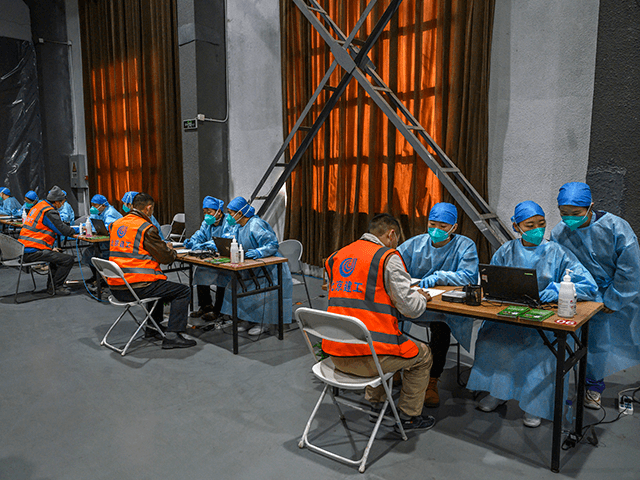China’s Global Times government newspaper revealed on Monday that authorities have arrested 70 people involved in nearly two dozens cases of alleged sales of counterfeit Chinese coronavirus vaccines, including one suspect believed to have made nearly $3 million.
China has developed a poor record in recent years of criminal distribution of faulty, counterfeit, or otherwise unusable vaccines, including many vaccines used in standard pediatrics. Most cases have involved companies or individual health workers watering down vaccine doses, leaving those receiving the doses immunocompromised. The most high-profile case of vaccine fraud surfaced in 2018 after police revealed evidence that a major pharmaceutical company, Changchun Changsheng Bio-technology, had administered nearly 1 million faulty vaccine doses, leaving nearly that number of children exposed to diphtheria, whooping cough, and tetanus, among other diseases.
The revelation that nefarious groups have distributed fraudulent coronavirus vaccines delivers another blow to China’s reputation as a vaccine developer in light of internal resistance from Chinese nationals this year to taking their annual influenza vaccine; demand for the vaccine dropped dramatically in the aftermath of the coronavirus pandemic.
The Global Times reported on Monday, citing China’s largest Xinhua state news agency, that law enforcement officials would “crack down” on criminal attempts to profit from false coronavirus vaccines, though by the time that they made the announcement, criminals had reportedly profited to the tune of millions of dollars.
“As of Wednesday, 70 criminal suspects had been arrested in 21 vaccine-related cases, said the procuratorate in a public announcement, requiring all relevant departments across the country to curb the crimes in a joint national campaign,” the Global Times said. “According to a case revealed in the announcement, a suspect, surnamed Kong, along with his associates sold about 58,000 counterfeit COVID-19 [Chinese coronavirus] vaccines, making a profit of 18 million yuan ($2.78 million).”
Kong’s operation, reportedly the most elaborate identified at press time, profited by injecting people with saline or mineral water, which does not cause any negative health effects but also has no impact on an individual’s ability to contract Chinese coronavirus. Kong and others reportedly held “mass vaccination” events where they sold their false vaccines, apparently without interruption from the Communist Party.
The Global Times reported the arrests of those considered the major players in the scheme occurred in November and December. It did not explain why authorities waited two months to alert the public.
Authorities hinted that some of the saline “doses” were smuggled abroad, but did not elaborate. It remains uncertain if the nations potentially affected are those who contracted with the Communist Party to purchase “Coronavac” and if their authorities are aware of the situation.
Xinhua made a similar announcement in early February regarding the arrests of 80 people who also sold saline syringes as coronavirus vaccines. As the report on that occasion did not name any of those arrested, it is not clear if these individuals are part of the same schemes as those revealed on Monday. Most of the alleged 3,000 false vaccines distributed in the earlier scheme spread through the nation’s east coast, most prominently in Beijing; the report on Monday suggested that doses had reached as far as Hong Kong.
The use of saline in syringes echoes the tactics involved in the Changsheng Biotech scandal in 2018. On that occasion, authorities revealed that the company had sold water-down vaccines as legitimate to parents. Changsheng also manufactured ineffective vaccines for diseases like rabies and sold them, anyway, as legitimate medical products. The company falsified manufacturing records to keep government drug regulating authorities unaware of the distribution of the faulty vaccines.
Chinese authorities arrested 15 of the highest-ranked executives in the company and ordered a “thorough investigation” into the distribution of false or faulty vaccines, but by then outraged parents were too angry about their children being exposed to diseases needlessly. Protests erupted nationwide, including a particularly violent incident in January 2019 in which a group of outraged parents physically assaulted a Communist Party officials in the street in Jiangsu province. Police in video of the incident appeared to do little to deter the attack.
Shortly after the details of the Changsheng scandal emerged, authorities revealed yet another incident of tampering with vaccines. Police reportedly identified a nurse in Shijazhuang, northern China, in February 2019 accused of systematically watering down vaccines at her local clinic to make each dose last longer, saving the clinic money.
Amid the Chinese coronavirus pandemic last year, residents of northwest Lanzhou, China, were forced to confront a different kind of vaccine scandal: the local Lanzhou Biopharmaceutical Plant had used expired sanitizing products to keep their facility clean, resulting in a city-wide outbreak of the highly infectious bacterial disease brucellosis. Brucella, the bacteria responsible for the outbreak, can contaminate individuals through the air, also making the outbreak difficult to contain.
The Lanzhou disease outbreak affected over 3,000 people.
The South China Morning Post revealed in September that, after years of health hazards emerging as a result of criminal pharmaceutical company behavior, Chinese citizens were increasingly saying no to influenza vaccines, dramatically reducing demand for the shot.
“[W]hile China has the capacity to increase flu vaccine supply, public demand has remained low because of a lack of trust, a lack of public awareness, poor access, as well as cost,” Huang Yanzhong, a senior fellow for global health at the Council on Foreign Relations, told the Post.
Follow Frances Martel on Facebook and Twitter.

COMMENTS
Please let us know if you're having issues with commenting.